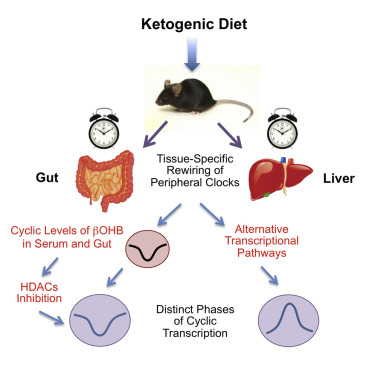当前位置:
X-MOL 学术
›
Cell Metab.
›
论文详情
Our official English website, www.x-mol.net, welcomes your
feedback! (Note: you will need to create a separate account there.)
Distinct Circadian Signatures in Liver and Gut Clocks Revealed by Ketogenic Diet.
Cell Metabolism ( IF 27.7 ) Pub Date : 2017-Sep-05 , DOI: 10.1016/j.cmet.2017.08.015 Paola Tognini 1 , Mari Murakami 1 , Yu Liu 2 , Kristin L Eckel-Mahan 3 , John C Newman 4 , Eric Verdin 4 , Pierre Baldi 2 , Paolo Sassone-Corsi 1
Cell Metabolism ( IF 27.7 ) Pub Date : 2017-Sep-05 , DOI: 10.1016/j.cmet.2017.08.015 Paola Tognini 1 , Mari Murakami 1 , Yu Liu 2 , Kristin L Eckel-Mahan 3 , John C Newman 4 , Eric Verdin 4 , Pierre Baldi 2 , Paolo Sassone-Corsi 1
Affiliation

|
The circadian clock orchestrates rhythms in physiology and behavior, allowing organismal adaptation to daily environmental changes. While food intake profoundly influences diurnal rhythms in the liver, how nutritional challenges are differentially interpreted by distinct tissue-specific clocks remains poorly explored. Ketogenic diet (KD) is considered to have metabolic and therapeutic value, though its impact on circadian homeostasis is virtually unknown. We show that KD has profound and differential effects on liver and intestine clocks. Specifically, the amplitude of clock-controlled genes and BMAL1 chromatin recruitment are drastically altered by KD in the liver, but not in the intestine. KD induces nuclear accumulation of PPARα in both tissues but with different circadian phase. Also, gut and liver clocks respond differently to carbohydrate supplementation to KD. Importantly, KD induces serum and intestinal β-hydroxyl-butyrate levels to robustly oscillate in a circadian manner, an event coupled to tissue-specific cyclic histone deacetylase (HDAC) activity and histone acetylation.
中文翻译:

生酮饮食揭示了肝脏和肠道时钟的独特昼夜节律特征。
生物钟协调生理和行为的节律,使有机体适应日常环境变化。虽然食物摄入量深刻影响肝脏的昼夜节律,但不同的组织特异性时钟如何对营养挑战进行不同的解释仍鲜有研究。生酮饮食(KD)被认为具有代谢和治疗价值,但其对昼夜节律稳态的影响实际上尚不清楚。我们发现生酮饮食对肝脏和肠道生物钟具有深远且不同的影响。具体来说,肝脏中时钟控制基因的幅度和 BMAL1 染色质募集会因 KD 发生显着改变,但肠道中则不会。 KD 诱导两种组织中 PPARα 的核积累,但昼夜节律阶段不同。此外,肠道和肝脏时钟对生酮饮食补充碳水化合物的反应也不同。重要的是,KD 会诱导血清和肠道 β-羟基丁酸水平以昼夜节律方式剧烈波动,这一事件与组织特异性环状组蛋白脱乙酰酶 (HDAC) 活性和组蛋白乙酰化相关。
更新日期:2017-09-05
中文翻译:

生酮饮食揭示了肝脏和肠道时钟的独特昼夜节律特征。
生物钟协调生理和行为的节律,使有机体适应日常环境变化。虽然食物摄入量深刻影响肝脏的昼夜节律,但不同的组织特异性时钟如何对营养挑战进行不同的解释仍鲜有研究。生酮饮食(KD)被认为具有代谢和治疗价值,但其对昼夜节律稳态的影响实际上尚不清楚。我们发现生酮饮食对肝脏和肠道生物钟具有深远且不同的影响。具体来说,肝脏中时钟控制基因的幅度和 BMAL1 染色质募集会因 KD 发生显着改变,但肠道中则不会。 KD 诱导两种组织中 PPARα 的核积累,但昼夜节律阶段不同。此外,肠道和肝脏时钟对生酮饮食补充碳水化合物的反应也不同。重要的是,KD 会诱导血清和肠道 β-羟基丁酸水平以昼夜节律方式剧烈波动,这一事件与组织特异性环状组蛋白脱乙酰酶 (HDAC) 活性和组蛋白乙酰化相关。











































 京公网安备 11010802027423号
京公网安备 11010802027423号